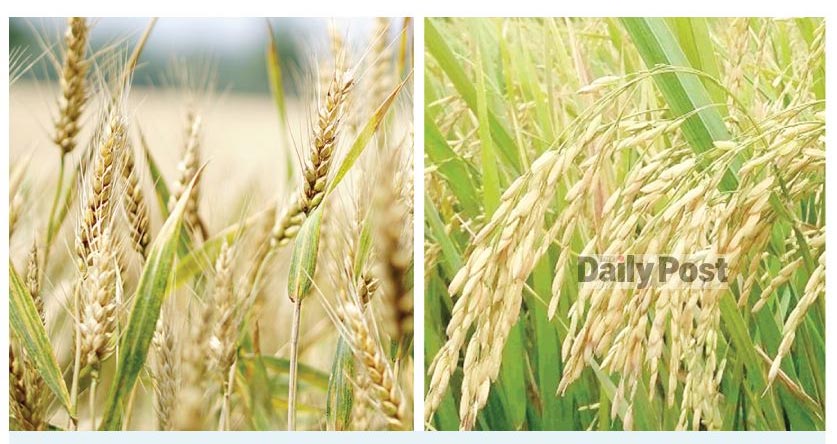-4 cr tons of rice produced in country annually
- Demand of wheat in country is 70-75 lakh tons per year
-3 cr 60 lakh tons rice required. Last year production was 4 cr 13 lakh tons
- NBR reduced import duty on rice from 62.5 pc to 25 pc
The staple food of the country is rice then wheat. Earlier rice was imported from different countries but now it has come down to zero percent. However, in the current situation, besides increasing the stock, the government has taken the initiative to reduce the import duty to keep the price bearable. Despite this, traders are not showing interest in importing the main food grain of the country. Due to the dollar crisis, the import of wheat is also decreasing due to the complexity of Letter of Credit (LC). In the market, the prices of both the food products are on the upward trend.
According to the data of the Department of Food, the total wheat imported in the country in the fiscal year 2023-24 was 66 lakh 28 thousand 580 tons. Out of this, 7 lakh 84 thousand 280 tons come at the government level and 58 lakh 44 thousand 300 tons at the private level. In the current financial year, till November 3, only 1748 thousand tons have been imported. At the government level, 2 lakh 45 thousand 180 tons of wheat was brought from the world market in these four months, and 15 lakh 2 thousand 500 tons at the private level. On the other hand, no rice was imported at this time.
The demand of wheat in the country is 70-75 lakh tons per year. Of this, 60 percent of the total demand is imported from Ukraine during normal times, but currently it has decreased to 40 percent, according to the concerned businessmen. Imports of wheat from the war-torn country have increased steadily over the past few years, but it started to decline from FY 2022-23.
According to the data of Bangladesh Bank, in the fiscal year 2022-23, wheat imports from Ukraine totaled $1,658 million, in the fiscal year 2021-22 it was $2, 065 million. The previous fiscal year brought in wheat worth $1,558 million, compared to $1,491 million in 2019-20.
Wheat imports from other source countries also declined. Due to the Russia-Ukraine conflict, the demand for wheat in India has increased significantly in the last two years. Therefore, the neighboring country has banned the export of the food product. Wheat corruption is also going on in Pakistan, the exporting country.
Importers and wholesale traders of Khatunganj wholesale market of Chattogram said that apart from wheat, several daily food products including anchor, corn, and husk are imported from Ukraine. Many blame India's supply crisis and price hike or the Ukraine-Russia war as the reason for the decrease in wheat imports, but traders mainly bring forward the dollar crisis, difficulties in opening LCs and the liquidity crisis of banks. Due to this, the country's overall food grain reserves (rice and wheat) are now lower than at any time in the past.
According to the updated information of the Ministry of Food, the government stock of food grains was 13 lakh 60 thousand 973 tons last Sunday. Among them, rice is 9 lakh 8 thousand 37 tons, wheat is a little more than four and a half lakh and paddy is 4 thousand 61 tons.
The managing director of a leading company that imports wheat from Ukraine said on the condition of anonymity, "Even though the dollar crisis has reduced compared to before, there is still some difficulty in opening LCs." Due to the increase in the intensity of the war, the import of wheat from Ukraine is also being interrupted. Moreover, the import of the food product from Russia has also decreased due to adverse weather.
According to the market sources, currently, the wheat of Ukraine region is being traded in the country's market from 1,350 to 1,370 per maund (37.32 kg). On the other hand, wheat imported from Canada or Australia is trading at Tk 1,470 to 1,500. A few months ago, the price of wheat was between Tk 1,300 and Tk 1,400 per maund. At present, the price of wheat has increased by about Tk 100 per maund. At the beginning of this year, it came down to 1 thousand 250 taka. But traders believe that wheat is going back to the previous price due to the decrease in stocks and imports.
Md Nurul Alam, former director of Chattogram Metropolitan Chamber of Commerce and owner of M/s A Zaman Trading, an importing company in Khatunganj, said, "Even a few years ago, about 60 percent of the country's total wheat was imported from Ukraine. Due to two years of continuous war, wheat imports from the country have decreased slightly. However, it has not stopped at all, imports are continuing according to the domestic demand and the capacity of the importers.
Meanwhile, Aman's plantations have been damaged by recent heavy rains and floods. Those concerned believe that the amount of loss in production can be around 8 lakh 39 thousand tons. According to BBS data, about 4 crore tonnes of rice is produced in the country annually. Of this, one and a half million tons comes in the Aman season. The interim government is trying to encourage imports and increase local stocks by cutting tariffs to prevent rice prices from rising further as yields of the country's second-largest crop decline. On October 20, the National Board of Revenue (NBR) reduced the import duty on rice from 62.5 percent to 25 percent.
However, the businessmen did not respond much to that. They say that the price of rice is high in the world market. As a result, buyers have to buy imported rice at a higher price than the current market price of the country. Therefore, traders are not responding due to the fear of loss.
The owners of rice coal also say that since the price of rice in neighboring India is high, even if the duty is reduced in Bangladesh, the importers will not be able to make any profit if imported from there. Moreover, due to transportation and other costs, the price of imported rice will be much higher than the domestic market.
According to Bangladesh Bureau of Statistics (BBS) data, per capita daily rice consumption in the country is 328.9 grams. According to the daily calculation of 17 crore people, about 2 crore 60 lakh tons of rice is required annually. People take this rice only as rice. Apart from this, another crore tons of rice is used for various poultry feed, seeds and other needs. In all, 3 crore 60 lakh tons are required. But last year the production was 4 crore 13 lakh tons.
According to the government, the import of rice is now zero. Although food and grain-type food products have been imported, no rice has been imported at the government and private levels in the last two years, according to the information of the Food Directorate. Bangladesh mainly imports rice from India, Myanmar, Thailand and Vietnam.
ZH






